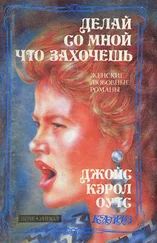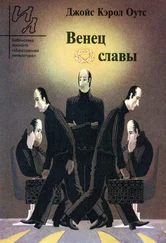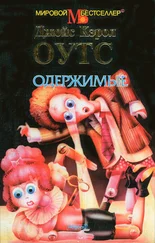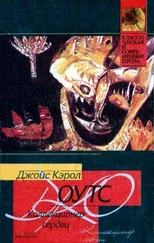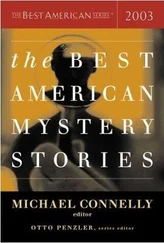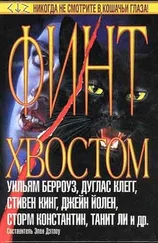Like one positioning to deliver a coup de grâce Lorene leaned forward on her elbows to smile cruelly across the table at them. “‘Would never’—what? You’re always making excuses for Virgil, Mom. Classic maternal ‘enabler.’”
“‘Enabler’… Well, I think I know what that means.”
But Jessalyn sounded uncertain. No one ever criticized her— she could not see, comprehend, somehow.
“Yes! An ‘enabler’ is one who ‘enables’ another individual to persist in addictive and self-destructive behavior. An enabler invariably ‘means well’ and her well-meaning can precipitate catastrophe. No one can dissuade her .”
Lorene spoke with zest. She was never so much in her element as when she was pointing out the flaws in others; her zinc-eyes glittered.
Her face was an unsentimental elf’s face—plain, small as if squeezed together, tough.
The other McClarens were intimidated by Lorene when she was most herself. Even Whitey preferred to stay out of the fray.
Sophia suggested driving over to Virgil’s cabin. She would volunteer.
Lorene said irritably: “That’s exactly what he wants . All of us jumping loops for him .”
“Jumping through hoops, I think you mean.”
“Don’t be flippant, Sophia. If there is anything that grates the soul, it’s adolescent flippancy—I am surrounded by it every day, and it’s destroying me. You know exactly what I mean, and you know that I’m right.”
At last Whitey spoke, somewhat reluctantly.
“Sophia, no. You will not drive over to get your brother. That would be approximately fourteen miles round-trip—you are not his keeper. Nor will we further interrupt this meal. Lorene is correct: we should not ‘enable’ Virgil to behave rudely.”
Lorene smiled, triumphant. Never too “mature” not to brighten when your parent corrects a sibling in front of everyone.
Beverly too rejoiced, inwardly. Her position, exactly! A family is a battleground, constantly shifting allies and enemies.
At the other end of the table (Beverly saw) Jessalyn pressed a hand to her heart, in silence. She was trying to smile, bravely. Obviously it pained her to hear the father of her children speak harshly of any of the children.
For any displeasure the father takes in their children has to be the mother’s fault, somehow.
Well, perhaps not entirely! That is an outmoded notion.
And yet—unavoidably, it did seem to be so. Like a table at a tilt, if just a very subtle tilt, the blame would roll down to Jessalyn’s end, where Jessalyn would put out her hand gently and unobtrusively to arrest it.
(Did Beverly feel that way, too? When Steve complained of the children?)
(You could not just shout at the man: They are your children, too! Whatever their faults, you are half to blame! )
“But, Daddy, what if something actual has happened to Virgil?” Sophia asked; and Thom said, with a wink, “Nothing ‘actual’ ever happens to Virgil. Haven’t you noticed?”
Thom, named for an older brother of Whitey’s who had died in the Vietnam War, had long been designated his father’s heir. In his late thirties he was still the aggressively competitive boy, smartest of the children, or in any case the most charismatic, very good-looking and sturdily adult-male, with a cruel, cutting smile. Even Jessalyn was fearful of his sarcasm though never in memory had Thom turned his wit upon either of his parents.
“We will eat this delicious meal which Beverly has prepared, without Virgil. If he joins us, we will welcome him. If he does not, we will not. We will begin.”
Whitey spoke somewhat flatly, not with his usual ebullience. The exchange had begun to annoy him, or to weary him. Beverly glanced at her father covertly.
He was an imposing man, big-boned, with the fatty-muscled build of a former athlete. In his mid-sixties he’d begun to lose height and so it was startling to his children to see him, and to realize that he wasn’t any longer as tall as they expected; though each time they saw him was a surprise, for they could only imagine him as he’d been when they had been growing up—well over six feet tall, weighing well beyond two hundred pounds. In repose his lined, boyish face was affable, big and broad with the look of an old coin, somewhat worn, of a faint coppery hue as if heated blood beat close beneath it. His eyes were wonderful eyes—quick, alert, wary, suspicious and yet good-natured, humorous—crinkled with laugh lines. When he’d been quite a young man his brown hair had turned a remarkable snowy-white, and had become his most distinguishable feature. In any crowd you could pick Whitey McClaren out immediately.
Though Whitey was not so easy to know, as people wished to think. His genial demeanor was a kind of mask that did not suggest the gravity of his soul; his playfulness, prankishness, was a way of hiding from others his intense and brooding seriousness, that was not always so very nice.
In his innermost heart, a puritan. Impatient with the foibles of the world. In particular, impatient with so much talk of his younger son.
Seeing him frown, Jessalyn caught Whitey’s eye. The length of the table between them, but instantaneously Whitey’s expression changed.
Whitey darling. Don’t fret! I love you.
It never ceased to amaze Beverly, how her parents could connect.
She was envious, perhaps. They all were.
Jessalyn said, “Whitey is right! If Virgil shows up he won’t mind at all if we begin dinner before him.”
They began. They ate. The meal, passing for Beverly in a buzzing blur, was to be pronounced a great success .
Beverly laughed as if delighted. Well—she was delighted.
Is this my life? Reduced to this? Humored by my family.
Humored, pitied by my children. Not a model for the girls!
But—better humored (and pitied) than not.
“MOM? HELLO…”
Nothing so unnerving as walking into a house that is unlocked—and, seemingly, empty.
A house that should not be unlocked. And should not be empty.
Beverly would long recall entering the house on Old Farm Road that afternoon. As it would come to be recalled— that afternoon.
Her parents’ house was more familiar to her than her own house yet, empty, made unfamiliar as in a distorted dream.
“Mom?”—her voice, confident elsewhere, thinned in this house to the voice of a frightened girl.
Well—no one appeared to be home. Beverly had entered into the kitchen, by the side door that was the door most frequently used.
That the kitchen door was unlocked did not mean that Jessalyn must be home; for Jessalyn often neglected to lock the door when she left the house, to Whitey’s displeasure if he knew.
“Mom? Dad?”—(but it was less likely that Whitey would be home, if Jessalyn were not home. It did not seem probable that Whitey could be home if Jessalyn were not home).
Bad news. Family emergency. Unmistakable. But—what?
Of the McClaren daughters it was Beverly who worried the most. You never get over being the oldest girl.
Their father had chided her: “It doesn’t do anyone any good to be always imagining the worst case scenario.”
Worst case scenario . As a girl she hadn’t quite known what it meant. Through the years the phrase had echoed in her memory as Worst Case Scenario.
Of course—(Jessalyn also understood)—Beverly imagined the Worst, in order to nullify its power. The Worst could never be exactly as you imagined it—could it?
Daddy stricken with a stroke, heart attack. In a car crash.
Mommy ill. Collapsed. Among strangers who had no idea how special she was. Oh—where?
Читать дальше

